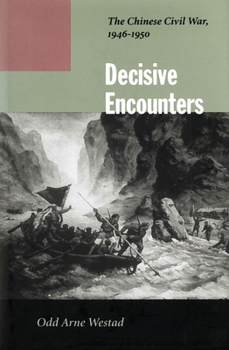Decisive Encounters: The Chinese Civil War, 1946-1950
Select Format
Select Condition 
Book Overview
The Chinese Civil War was one of the key conflicts of the twentieth century. The Communist victory determined Chinese history for several generations, and defined international relations in East Asia during the Cold War and after. Despite its importance and scope--its battles were the largest military engagements since World War II--until now remarkably little has been known about the war, and even less about its effects on the societies that suffered through it. This major new history of the Chinese Civil War attempts to answer two central questions: Why was the war fought? What were the immediate and the lasting results of the Communists' victory? Though the book highlights military matters, it also shows how campaigns were mounted alongside profound changes in politics, society, and culture--changes that ultimately contributed as much to the character of today's China as did the major battles. By analyzing the war as an international conflict, the author explains why so much of the present legitimacy of the Beijing government derives from its successes during the late 1940s, and reveals how the antagonism between China and the United States was born.
Format:Paperback
Language:English
ISBN:080474484X
ISBN13:9780804744843
Release Date:March 2003
Publisher:Stanford University Press
Length:427 Pages
Weight:1.33 lbs.
Dimensions:1.0" x 6.0" x 9.2"
Customer Reviews
1 rating
Good but partisan summary
Published by Thriftbooks.com User , 17 years ago
Professor Westad offers here a concise and well-written overciew of the Chinese civil war and its international ramifications. While he is an excellent cold war scholar and I *do* recommend the book, I do so with certain reservations. He begins by blaming Stalin for "inadvertantly" beginning the Chinese civil war via Soviet troop withdrawals from Manchuria. This analysis reflects the still-dominant view among Western academics to reflexively blame the USSR and Stalin for the cold war in general, although Professor Westad adds the liberal adverb caveat of "inadvertant." There is no analysis of what the Soviet alternative could have been: to remain in occupation of Manchuria? And then, of course, Stalin would now be blamed for "advertantly" causing the Chinese civil war by staying, and providing sanctuatry for the CCP to grow. Similarly, Professor Westad is inclined to give Chiang Kai-Shek ("Jiang" - sorry, I just *can't* get used to Pin-Yin!) the benefit of the doubt. Professor Westad is of the opinion that Chiang was "deeply concerned" about the corruption of his Kuomintang regime, and "took steps" to correct it; but as Professor Westad is surely aware, these could be little more than rhetorical scoldings of middle and lower level cadres. The true source of the KMT's rot was at the top. Any serious anti-corruption drive would have threatened the corporate monoplies of the Soong family, which had been the backbone of Chiang's rise to power, and of the "Green Gang," a mafia brotherhood of which Chiang had long been a member. Ralph Thaxton's book, "Salt of the Earth," shows how peasant cottage industry was in basic opposition to the central monopolizing policies of the KMT and its confiscatory tax system for the favored few. Thus a mere "anti-corruption drive" could not have removed deep-seated peasant opposition going back some 20 years, and reinforced by the KMT's postwar carpetbaggery. Also, Professor Westad brushes aside the CCP claim that it "bore the brunt" of the Japanese occupation. I find this an unsupportable conclusion, based on the logic of events. Chiang did not have the resources to drive the Japanese out of China. Knowing it would be suicidal to risk his remnant regime in an all-out assault, he knew also he must accomodate their presence, however unwillingly. But there was great advantage to him in having the Japanese in China, in providing a law and order he could not and keeping the Communists in line. Proof of this was his continued reliance on the Japanese remaining after the peace, to help him consolidate "Free China." In terms of attacks on the Japanese, the CCP definitely had nothing to lose and a world to gain by pushing a confrontional anti-Japanese policy, and thus *can* be said to have born "the brunt," however limited, of anti-Japanese resistance. But in spite of my criticisms, I do recommend the book as a concise and necessary overview of a time and place that remains shrouded in cold war night and fog.






